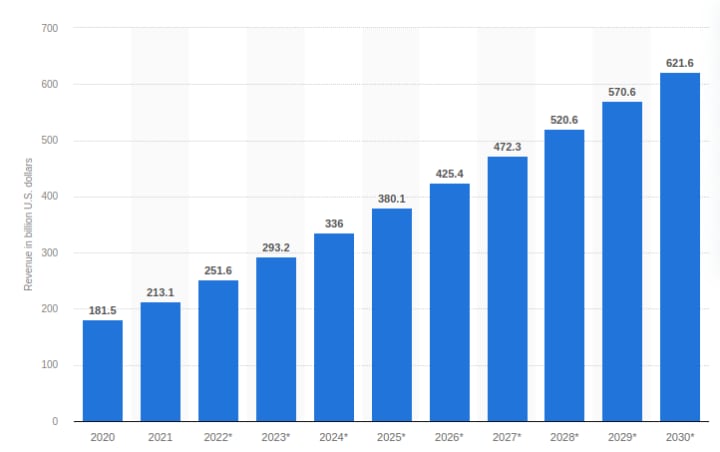How to Leverage Emerging Technologies in Mobile App Development: AR, VR, and IoT
Embracing the Future: Unleashing the Potential of AR, VR, and IoT in Mobile App Development

Are you ready to dive into the future of mobile app development?
In today's digital age, emerging technologies such as Augmented Reality (AR), Virtual Reality (VR), and Internet of Things (IoT) are transforming the way we interact with apps.
From enhancing user experiences to creating immersive environments, these cutting-edge advancements hold immense potential for developers.
So, if you're curious about how to leverage AR, VR, and IoT in your mobile app projects, this blog post is the right place where you can explore the world of emerging technologies.
Today, we will unravel the secrets behind successful integration and explore groundbreaking possibilities that will revolutionize your app development strategies.
It's time to embrace innovation like never before - let's tap into the limitless power of AR, VR, and IoT!
Understanding Emerging Technologies
With fast-paced technological evolution, staying ahead of the curve is essential to captivate users and deliver exceptional experiences.
AR, VR, and IoT in mobile app development are leading technologies that have completely changed the scenario.
These cutting-edge innovations hold the power to transform how we interact with apps and the world around us.
AR adds a magical layer to reality, superimposing digital elements onto our physical surroundings. Picture trying on virtual shoes before purchasing them or exploring historical landmarks through your smartphone camera. This has also led to increased demand for Augmented Reality development services in the industry.
VR takes users on extraordinary journeys to entirely immersive worlds, whether for gaming, education, or virtual tourism. Imagine walking the streets of Paris or surviving a zombie apocalypse, all from the comfort of your couch.
IoT connects and empowers communication devices, creating a seamless, smart ecosystem. Imagine controlling your home's lighting, security, and appliances through a single app, even from miles away. Now, businesses can successfully leverage this technology with the support of IoT app development companies, leading to revolutionary changes in various sectors.
Virtual Reality (VR)
Virtual reality has taken entertainment to the next level by enabling people with extraordinary abilities to experience digital content. It transports them to unimaginable realms of possibilities.
With VR, we can break free from the constraints of the physical world and delve into immersive, interactive experiences like never before.
Now wonder this is the reason why businesses are inclined towards this technology to empower their mobile app development with AR/VR capabilities.
Here's what makes VR truly exceptional:
Immersive Escape: VR lets you escape reality and step into a fully simulated world, from futuristic cities to fantasy worlds, where we become active participants in the story.
Unparalleled Gaming: Gaming in VR takes your adrenaline to a whole new level. Imagine wielding a virtual sword, commanding starships, or battling zombies as if you're truly there.
Innovative Education: VR has found its way into classrooms as well, allowing students to explore history, science, and complex concepts in a hands-on, engaging manner.
Transformative Training: Several industries leverage VR to train professionals in various fields, from medical surgeries to hazardous environments, enhancing safety and efficiency.
Internet of Things (IoT)
IoT empowers everyday objects with intelligence, allowing them to communicate, gather data, and work harmoniously to simplify our lives. It is one of the notable AI transformations in software testing adopted by each IoT app development company.
A Statista report predicted the global market for the Internet of Things (IoT) was estimated to be worth around 182 billion dollars in 2020, and it is anticipated to reach more than 621 billion dollars in 2030, triple its current size in that time.
Additionally, the number of Internet of Things (IoT) connected devices is expected to triple globally during this time.

Here's what makes IoT a game-changer:
Smart Home Convenience: IoT-enabled devices like smart thermostats, lighting systems, and voice-activated assistants bring automation and convenience to our homes, making tasks a breeze.
Enhanced Health and Fitness: From fitness trackers to smart health monitors, IoT revolutionizes how we manage our well-being, tracking vital stats and providing personalized insights.
Connected Transportation: IoT plays a vital role in transforming transportation, enabling smart navigation, real-time vehicle diagnostics, and even autonomous driving.
Safety and Security: IoT-driven surveillance cameras, smart locks, and sensors enhance our safety, providing real-time alerts and peace of mind.
Exploring the Potential of AR in Mobile Apps
Augmented reality app development can remarkably bridge the gap between the real and virtual realms, overlaying digital elements onto our physical surroundings.
There are so many reasons why businesses should hire Augmented Reality app developers to scale their businesses.
Here's why AR is a game-changer in mobile app development:
1. Enhanced User Engagement: AR captivates users with interactive and immersive experiences, boosting engagement and retention rates.
2. E-Commerce and Retail Revolution: AR enables customers to virtually try on products, envision the furniture in their homes, and even see how clothes fit before purchasing.
3. Gamification Galore: Incorporating AR games into mobile apps injects fun and excitement, encouraging users to explore and compete in a captivating mixed reality.
4. Seamless Travel and Navigation: AR-powered maps and navigation assist users in finding their way with real-time visual cues.
By harnessing the potential of AR, VR, and IoT in mobile app development, software engineers can craft extraordinary experiences that delight users and open doors to endless creativity.
Overcoming Challenges in Implementing Emerging Technologies
Implementing emerging technologies like AR, VR, and IoT in mobile app development could lead to significant improvements, but it doesn’t come easy.

As developers embark on this innovation journey, they must be aware of the hurdles that may arise and proactively find solutions to overcome them.
Here are the key challenges to consider:
1. Technical Considerations: Integrating complex technologies requires expertise, and developers must stay updated with the latest tools and frameworks.
2. User Privacy and Security: As apps collect sensitive data, ensuring user privacy and protecting against security breaches is paramount.
3. Compatibility and Fragmentation: With diverse devices and operating systems, ensuring smooth performance across all platforms can be challenging.
4. User Experience and Adoption: Introducing new technologies can be daunting for some users, leading to resistance or hesitancy in adopting the app. Striking the right balance between functionality and user experience is crucial for widespread acceptance.
5. Cost and Resources: Implementing emerging technologies may require additional resources and investment. Small development teams or startups might face budget constraints or a lack of expertise, posing a challenge in adopting these innovations.
6. Content Creation and Maintenance: VR and AR apps demand engaging and high-quality content. Regular updates and maintenance are essential to keep the app relevant and appealing to users.
7. Data Integration and Analysis: IoT apps rely on data collection from various devices, requiring efficient data integration and analysis systems to derive meaningful insights.
Best Practices for Integrating Emerging Technologies
Mobile app development with AR/VR capabilities can help strengthen your business. When integrating emerging technologies like AR, VR, and IoT in mobile apps, following best practices is key to creating exceptional user experiences and ensuring seamless functionality.
Let's explore the top strategies for successful integration of AR, VR, and IoT in mobile app development:
1. Identify the Right Use Case: Choose technologies that align with your app's purpose and add genuine value to the user journey.
2. Balance Functionality and User Experience: Strive for a smooth user experience without overwhelming users with excessive features.
3. Utilize Cross-Platform Development Frameworks: Opt for frameworks that allow easy deployment across multiple platforms, reaching a wider audience.
4. Conduct Thorough Testing and Iterations: Rigorous testing is essential to iron out bugs or usability issues. Iterate based on user feedback to continuously enhance the app.
5. Prioritize User Privacy and Data Security: Implement robust security measures to safeguard user data and build trust with your audience.
6. Offer Onboarding and Support: Provide clear instructions and tutorials to help users navigate the app's functionalities.
7. Optimize for Performance: Ensure the app runs smoothly on various devices, minimizing load times and lag.
In Closing
In conclusion, with the help of these advancements in AR, VR, and IoT in mobile app development, businesses can deliver their customers' immersive experiences and improved functionalities.
Developers can enthrall audiences and reimagine user interactions by embracing the wonder of AR, the escapism of VR, and the connection of the IoT.
The user experience must be prioritized, obstacles must be overcome, and data security must be maintained.
Mobile apps have the power to break down barriers and create a future in which technology smoothly improves our lives by following best practices and remaining flexible.





Comments
There are no comments for this story
Be the first to respond and start the conversation.